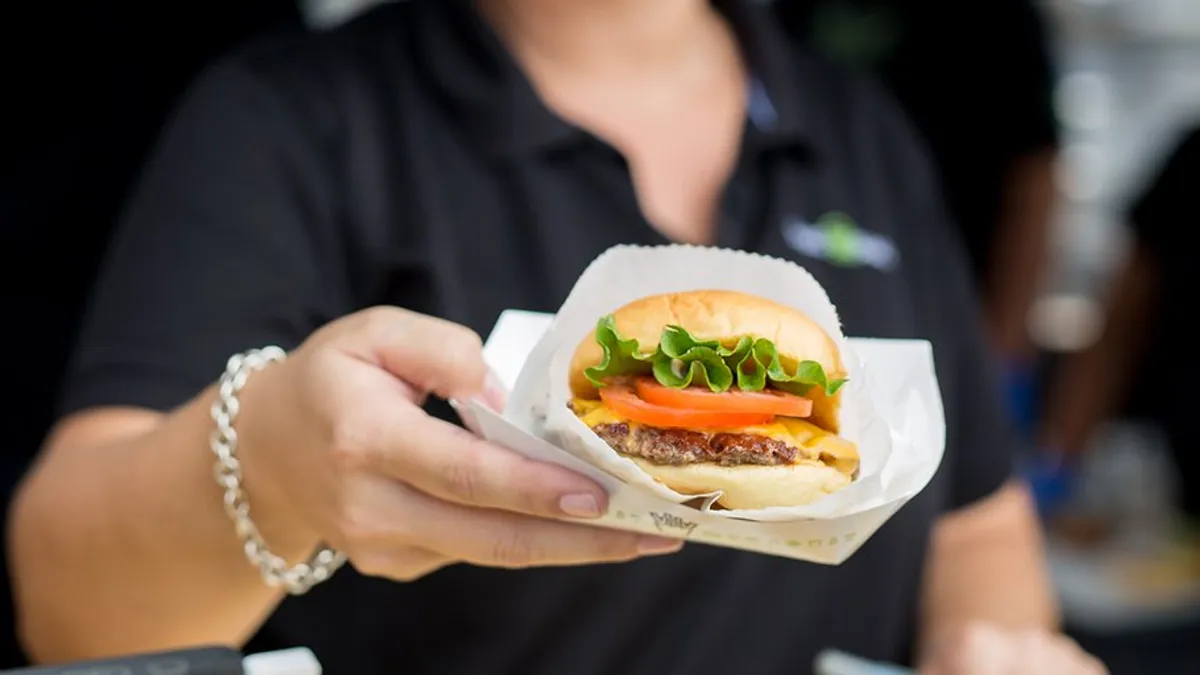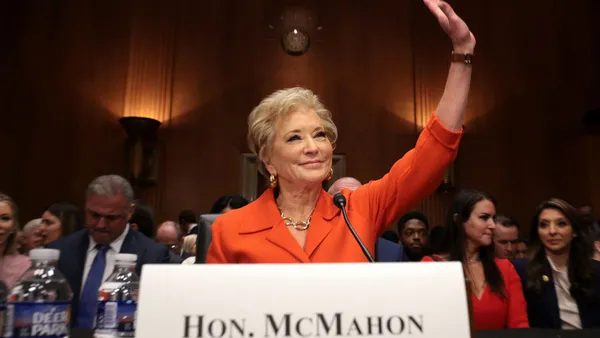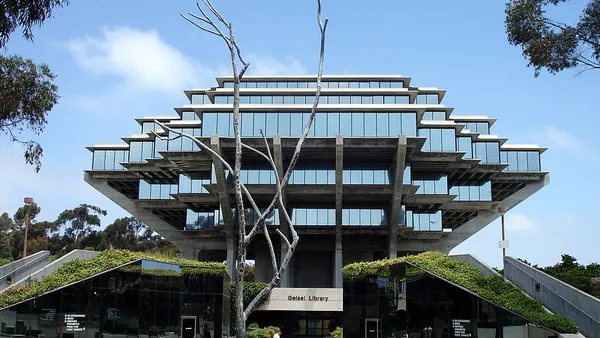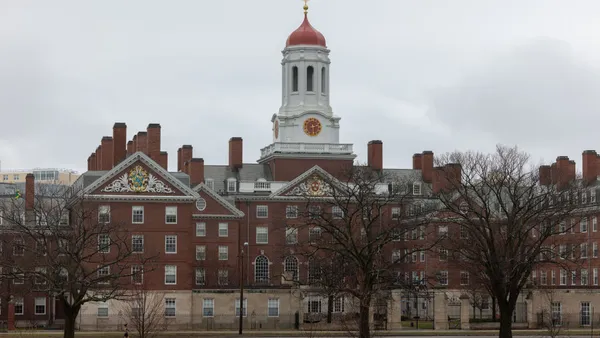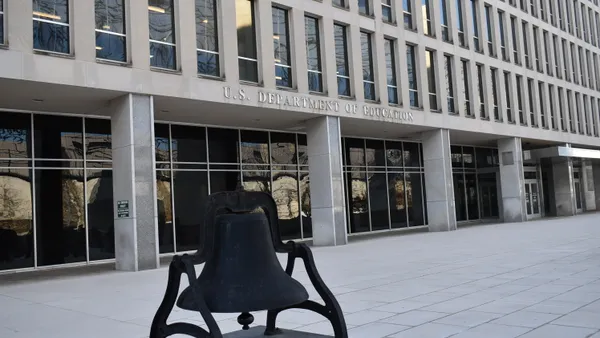Ultimately, the spark that ignited Ursinus College’s successful moves to reduce food waste came from realizing there was too much plastic in their compost.
The dining services at the small liberal arts college in Collegeville, PA, were offering students tiny plastic packets of butter and cream cheese to use on bagels, according to Kate Keppen, the school's director of sustainability. Those half-used packets would return to the kitchen, and some would accidentally wind up in the organics to eventually be composted. Keppen noted that compost and plastic was “not a good mix.”
A prominent East Coast composting plant with which Ursinus had a contract closed at about the same time, so Ursinus students, staff and administration took the initiative to reduce the excess food waste. As it turned out, the most cost-efficient and environmentally friendly methods were some of the simplest.
“What happened was tiny small things started adding up to a big sum. We utilize small plates in the cafeteria, we don’t use cafeteria trays, so that encourages people to take smaller portions, encouraging people to finish what is on their plate. On the plastics end, we started returning to old fashioned ways; instead of individual cream cheese packets, we went to having cream cheese and butter on the refrigerated end of the cafeteria, so people can take what they want,” Keppen said. “I did not think our students were going to give up the convenience of grabbing that bagel and cream cheese and going. But they did.”
Last year, Ursinus College won the Environmental Protection Agency’s “Sustainability Honors,” a part of the EPA’s Food Recovery Challenge. Ursinus had won the award by garnering the highest percent increase in food waste diversion in the previous year. Keppen said the school benefited from student passion and knowledge.
“It is solely through their consistent effort and willingness to talk and learn and work with my office and our dining services, and their willingness to be a partner in all of this has been key to everything,” she said.
Organizations, advocates tap student interest
Approximately 40% of food made in the United States goes uneaten, according to the Natural Resources Defense Council, which results in a loss of about $160 billion per year. On college campuses, 22 million pounds of food are wasted each year, with the average college student contributing to about 142 pounds in food waste. Despite the waste, approximately 41.2 million people in the country live in “food-insecure households,” according to the U.S. Department of Agriculture’s Economic Research Service. Food insecurity is also present on college campuses; a 2016 report by the National Student Campaign Against Hunger and Homelessness reported that 25% of community college students reportedly had “low food security,” with 20% of students at four-year institutions reporting the same.
“There are people that are food insecure and those people do not live far away from us. They live in our communities,” Keppen said, also acknowledging the environmental impact and the economic cost colleges and universities suffer due to such waste. “We’re throwing away dollar signs. Food was prepared and made and we’re throwing that into the trash can. What can we do that ultimately reduces the amount of food that is wasted and ultimately saves Dining Services some funds as well?”
Organizations including the Campus Kitchens Project are harnessing student interest in combating food waste and insecurity, with more than 60 student-driven kitchens in campuses and schools throughout the country. Students recover unused food, packaging and preparing it for community use. According to the EPA’s Food Hierarchy, food waste is best addressed by using only the food that is necessary, and if there is excess food, to supply it to others in need (though processing organics is still seen as beneficial if these steps are not applicable). Campus Kitchens commits to the latter task, and Dan Abrams, the organization's director, said the kitchens could benefit schools and their surrounding communities.
“We hope we see support coming from administrators who see this as a win for themselves, because they’re helping their community; it’s a win/win for the community and campus, with limited buy-in,” he said. “This is an investment by the school in community relations.”
Abrams said students who approached the organization were usually passionate and informed about food waste issues, and there were 31 schools actively working to open their own kitchens. The organization recovered 1,306,063 pounds of food in the 2015-2016 academic year, with more than 28,600 student volunteers took part in the programs. Abrams said that determining the best approach for each school was one of the most important barriers to overcome.
“It’s that each school is its own bureaucracy, so helping students traverse the bureaucracy of its own school can be challenging. The way one school does things is not the way every school does things,” he said. “It’s really up to the school and the students to find the best way for that to work.”
Keppen said it seemed that the need to address food waste on campuses was increasingly understood by administrators, but each institution had to find its own ways to forge solutions.
“I think if you were to bring it up with a group of higher ed administrators, I think there’s a baseline understanding that is an issue, including how much volume of disposables is coming out of higher education. They’re definitely aware of that; they’re seeing the bill for hauling this stuff away,” she said. “We’re trying to find the best practices, and it’s not a cookie-cutter answer. What works for Ursinus will probably not work for a Penn State.”
University of Michigan brings scale to sustainability
Keith Soster is the director of student engagement at the University of Michigan, with a focus on improving sustainability during the previous three years. Soster said UM committed to a 40% diversion rate from landfill by 2025 in 2006, and Dining Services had achieved significant success thus far; this year, they had diverted approximately 29.6% of their food waste. Soster said the school now offered smaller portions, as well as trayless dining, to reduce the amount of food students took from dining halls.
“The small plates allowed us to reduce the portion size and the protein, and because we have stations in most of our dining halls, it allowed people to taste more items,” he said. “If you don’t have a tray to put it on, it becomes more difficult. So you pick two plates, and you work on those, and you realize you’re actually full.”
The campus also committed to bin standardization, ensuring recycling options were placed near every waste basket to offer students the option. The college also transitioned from counting meals by the number of swipes into the dining hall per day to an unlimited meal plan option. Given only a limited number of swipes, a student might enter the dining hall and take a significant amount of food without eating all of it. An unlimited meal plan allows students to enter the dining facilities at numerous points in the day, allowing them to only purchase an apple or another small item. By doing so, the school could reduce portion sizes and students could engage in healthy eating habits, Soster said.
Soster also touted the importance of zero waste events, saying there was consistent interest from campus organizations in making sure their events did not add to the system’s waste total. With encouragement from UM President Mark S. Schlissel, there had been more than 300 zero waste events, with students and staff able to access compostable materials if desired.
Soster is also hoping to make compost bins prevalent throughout the campus with educational materials to help students determine what can be composted, and expressed optimism at the standardization of zero waste events. The school had managed to make large events zero waste, including a bicentennial event last year that drew 10,000 invitees and a post-convocation picnic with 6,700 students.
“When you get big groups of people together and you do zero waste events for things that are right in front of them, I think that’s the best bang for the buck,” he said, stressing the importance of such efforts for environmental protection. “I think it’s a responsibility for everyone to turn the world over to our children and our grandchildren in at least as good a shape as we found it.”
Keppen said schools interested in pursuing options to curtail food waste must have open conversations with students and staff from the outset from the start. Students’ interest in the issues was an opportunity higher ed institutions should not dismiss, Keppen said.
“Students are interested in food waste, getting food to the food insecure, getting locally sourced food and knowing where it’s coming from. I’m seeing this at Ursinus College, and I’m seeing this at other colleges,” she said. “If you bring them in and say ‘this is how a college or university operates’ and then say ‘this is what can we do here given the realities of our budget and staffing,’ to have that open and honest conversation, solutions will present themselves.”


